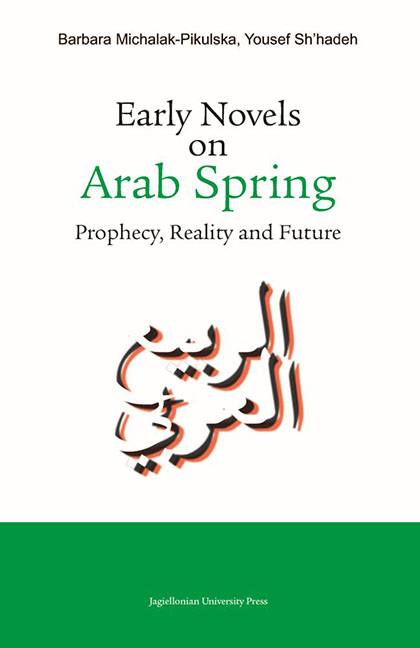Book contents
- Frontmatter
- Contents
- Introduction
- Part I Awakening of the Awareness of Subjugation – The Prophecy of the Spring of Nations in Arab Novels
- Part II At the Heart of the Arab Spring Events
- Part III The Future: The Spring Continues
- 17 Mu‘Taṣim Aš - Šā‘Ir : Uhzūǧat ar-raḥīl (A Song of Departure) and Fī intiẓār as-sulaḥfāt (Waiting for a Turtle)
- 18 Aḥmad ‘Abd Al - Malik : Al-Aqni‘a (Masks)
- 19 Ṭayba Aš - Šarīf Al - Idrīsī : Ḥaǧar min saqar (A Stone from Hell)
- 20 Amīra Aš - Širbīnī : ‘Itq (Liberation)
- 21 ‘ Izz Ad - Dīn Šukrī Fašīr : Bāb al-ẖurūǧ – risālat ‘Alī al-muf‘ama bi-bahǧa ġayr mutawaqqa‘a (The Gate to Leave – Ali’s Letter Filled with Unexpected Joy)
- Conclusion
- Bibliography
- Summary in Arabic
19 - Ṭayba Aš - Šarīf Al - Idrīsī : Ḥaǧar min saqar (A Stone from Hell)
Published online by Cambridge University Press: 13 October 2023
- Frontmatter
- Contents
- Introduction
- Part I Awakening of the Awareness of Subjugation – The Prophecy of the Spring of Nations in Arab Novels
- Part II At the Heart of the Arab Spring Events
- Part III The Future: The Spring Continues
- 17 Mu‘Taṣim Aš - Šā‘Ir : Uhzūǧat ar-raḥīl (A Song of Departure) and Fī intiẓār as-sulaḥfāt (Waiting for a Turtle)
- 18 Aḥmad ‘Abd Al - Malik : Al-Aqni‘a (Masks)
- 19 Ṭayba Aš - Šarīf Al - Idrīsī : Ḥaǧar min saqar (A Stone from Hell)
- 20 Amīra Aš - Širbīnī : ‘Itq (Liberation)
- 21 ‘ Izz Ad - Dīn Šukrī Fašīr : Bāb al-ẖurūǧ – risālat ‘Alī al-muf‘ama bi-bahǧa ġayr mutawaqqa‘a (The Gate to Leave – Ali’s Letter Filled with Unexpected Joy)
- Conclusion
- Bibliography
- Summary in Arabic
Summary
The novel Ḥaǧar min saqar (A Stone from Hell) by Saudi writer Ṭayba aš-Šarīf al-Idrīsī is a story centered on the inner life of its protagonist, a woman disappointed both in her country and in her family. Unable to find a place for herself, she decides to go away and observe from afar what happens in her homeland and in her household while she is absent.
The author also undertakes an analysis of the relationship between a mother and daughter, whose problems seem to stem from the fact that they cannot or do not want to express their true feelings. The heroine is a modern and liberated person, while her mother guards the tradition.
The writer is interested in the problems of her countrymen, and it seems that she wants to become the conscience of a nation that does not believe that anything will ever change in the lives of its people. Revolution is the only way through which they can take control of justice and freedom, and that is the main reason why people must rebel against the current state of affairs.
The novel focuses on the events of the Arab Spring, starting from the Tunisian revolution, through the Egyptian one, the revolution against the Yemeni dictator, as well as through riots in Bahrain to the civil war in Syria. The author is sure that the winds of this “Spring” will surely reach also other Arab countries, sweep away the dictatorships there and bring about the desired changes. The novel is a warning to those ruling with an iron hand; to the unjust Arab leaders who still do not want to see that freedom, democracy and respect for people are the law, and that they must come to be. After all, the fall of regimes is inevitable, because no one can endlessly act against the will of the people. And perhaps the allusion contained in the title of the work means that hell has come for despots and dictators. The writer dedicates the novel:
To those who run in search of freedom
Dignity and security
And those whose eyes sank in grief
The main topic of the novel, however, is the relationship between the mother and daughter – the latter of this pair is the narrator of the work.
- Type
- Chapter
- Information
- Early Novels on Arab SpringProphecy, Reality and Future, pp. 134 - 141Publisher: Jagiellonian University PressPrint publication year: 2022

